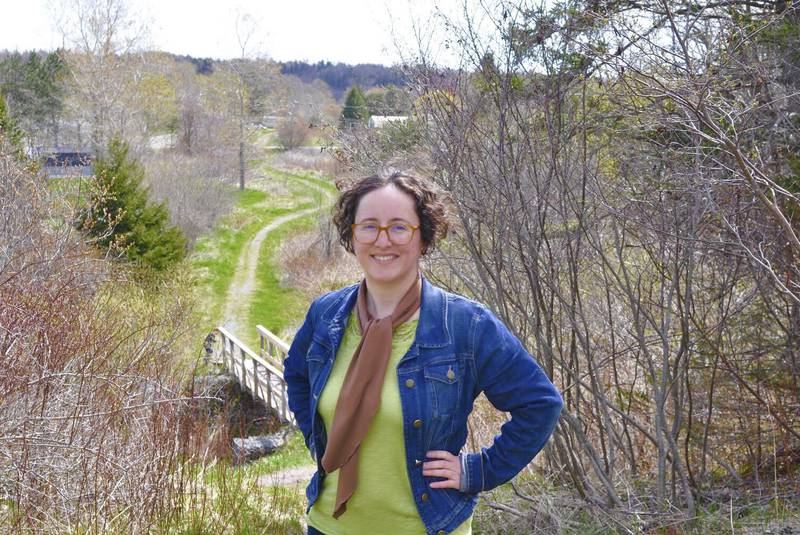KJIPUKTUK (Halifax) – Betsy MacDonald is the NDP candidate in Central Nova, the huge rural riding that takes in Pictou County, parts of Antigonish County, and stretches all the way into HRM and Guysborough.
Betsy is a mother and a musician. Over the years she has been involved in many social justice campaigns on poverty reduction, food security, health, gender and violence prevention, community gardening and youth leadership.
We talked with Betsy about Boat Harbour, poverty, climate change, how activism shapes her views, and what to do about the many challenges people face in rural Nova Scotia.

I know that you have roots in community activism. I was wondering how running in a federal election fits in with that experience, and also how that affects how you view the job description of a Member of Parliament?
I’ve been involved in feminists work at the community level, as well as work around poverty reduction, economic justice, and sustainability. For me, at the end of the day, it’s about people, whether you’re looking at policies that are made close to the ground, or in Ottawa. It’s about people’s struggles, the health of our communities and the well being of our planet. Being in federal politics means that you’re working at a bigger picture level, but it’s all connected.
Most of my activist work has been at the grassroots level. And even in my work with the Nova Scotia NDP caucus I’m very much working at the community level in my outreach role. So I spent a good deal of my time in communities in rural and small town Nova Scotia, talking with people about their challenges and what they would like to see from the politicians who represent them.
Are you running to win?
Absolutely, I am definitely running to win. I think the people of my riding deserve better representation, and a genuine progressive voice in Ottawa. There are issues that really matter in this federal election, such as the climate crisis, such as the struggles of working people and the state of our healthcare system. The three things that I consider the planks of our platform are climate action, health care, and affordability.
What’s your analysis in terms of the general malaise in rural Nova Scotia, manifesting as out-migration, an aging population, the decrease in services?
Rural people have by and large been overlooked when it comes to economic policy. We’ve seen that that the so called trickle down economics does not work for most ordinary people. And certainly rural communities have had not seen the benefit of policies aimed at attracting, for lack of a better name, big business.
We’ve seen policies aimed at so called economic growth that has in fact helped those at the top get better off, at the expense of our services, at the expense of our healthcare system, our education system and other social programs.
The current model of economic development is very urban-centric. My view of how we move forward economically in a place like Central Nova, is to look at the moment we find ourselves in with the climate crisis. This is a moment that requires us to rethink how we do business. Because business as usual, is killing the planet and hurting our people.
We need to not only invest in different kinds of jobs, different kinds of industries, but also we need to democratize our economy, we need an economy where, where workers have a voice, and where communities have a voice. An economy that focuses on small business, and things like local food production. This is a chance for us to do things differently.
What little industry there is In rural Nova Scotia is for a large part based on resource extraction. And then right away, you’re into this very controversial area, because then you you start talking about things like clear cutting, gold mining, which I think is imminent in your neck of the woods. How would you move away from that?
It isn’t that large businesses don’t have a place in our economy. But if companies want to do business in Nova Scotia, they need to be held to the highest possible environmental standards. And they need to treat workers well. We have some of the lowest wages in the country. We have forests that are being clear cut at an alarming rate. And we have communities saying no to things like gold mining and fracking.
As an NDP candidate, part of my role is to be a voice for people who want to protect the health of their communities and want to protect the environment. Right now there’s a power imbalance. And people who would like to see business conducted in a way that’s sustainable and fair do not necessarily have a partner in government.
What are your thoughts about poverty in rural NS, recognizing that a lot of the issues actually are under provincial jurisdiction, but that the feds are still big players in these issues.
In rural Nova Scotia a lot of people are self employed or precariously employed. There’s quite a warm reception of our platform around pharmacare and dental care, because there are a lot of people without coverage, or people who are paying for coverage for their drug plans and their dental care. It is forcing people to make hard choices like, do they take their required doses of medication, or do they split their pills to save on the cost? Sometimes people are choosing between being purchasing their meds or buying groceries. People are struggling with the cost of housing, Internet and phone bills, and childcare.
Rural transportation a big issue in rural Nova Scotia and small towns as well. That’s pushing some people out of communities. This is another area where, where if, if my party was in a position to implement our plan for climate action and good jobs, there would be an emphasis on creating sustainable community transit systems. There’s some to some good work being done, for instance, CHAD Transit in Pictou County and Antigonish Community Transit. But of course the services could be better and offered to more people.
What about Boat Harbour?
My position from the get go has been no pipe in the Strait and no extension to the Boat Harbour deadline.
What’s frustrating right now is how Liberal politicians at both levels are leaving the door open in terms of an extension to the legislated deadline. This is disrespectful to the community of Pictou Landing First Nation. Chief Andrea Paul, has been very clear that she will not entertain an extension to the deadline. At the end of the day, this is about doing what’s right for the people and doing what’s right for the planet.
(This ambiguity) is also deeply unfair to the workers at the mill and to the broader workforce affected by a possible mill closure. So my position, and my party’s position is that the pensions of mill workers need to be protected, and that there need to be supports for workers through the transition, including things like access to EI.
What is concerning, when you look at the state of forestry, in Nova Scotia is, is the rate of clear cutting. Our forests are being depleted in a way that’s unsustainable. And we have the Lahey report out now, which offers a different approach. It provides a vision that would build on sustainable forestry practices that are already taking place in the province.
Although there’s no question that a mill closure would have a significant impact on forestry and and would require significant adjustments, when you look at the big picture of what’s happening to our planet with with the climate crisis, we know we need to do things differently. But there should certainly be support for the forestry sector to get through this transition.
Transitions are hard. And transitions require leadership. But there is light at the end of the tunnel.
With a special thanks to our generous donors who make publication of the Nova Scotia Advocate possible.
Subscribe to the Nova Scotia Advocate weekly digest and never miss an article again. It’s free!



